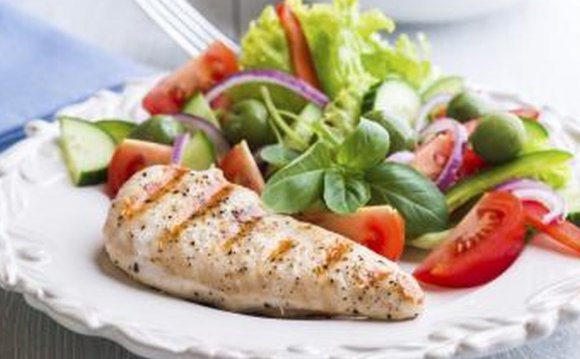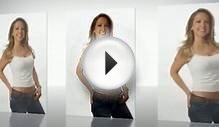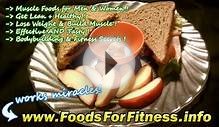
High protein, low carbohydrate diets are all the rage at the moment, with literally hundreds of different diets promoting this concept. However, there is a huge amount of variation in the amounts of protein, carbs and other foods included from diet to diet, with some recommending high protein meal replacements, others excluding all forms of carbs including fruit and some that recommend certain combinations of carbs and protein. With such variation between diets, it is understandably confusing as to what we should really be eating on a healthy high protein diet.
Who can follow a high protein, low carb diet?
A high protein, low carb diet is not for everybody and is by no means proven as the best way to lose weight. However, studies have suggested that for some people, this type of diet is an effective way to reduce fat and weight, particularly to kick start weight loss in those who are morbidly obese. High protein diets may contribute to weight loss in a variety of ways, for example it has been suggested that by reducing carbohydrates, the brain may receive less hunger stimulating hormones, resulting in a reduced appetite.
Hint: Try the (1200 calories balanced diet)
High protein diets work because…
High protein diets have been shown to, and result in the consumption of less calories in followers, which in turn leads to weight loss. Initial weight loss on a low carb diet may be due to water loss, which can be caused by a high protein intake. In many people, weight loss may also be seen simply due to a reduction in calories when carbohydrates are eliminated from the diet. Often people do not replace carbohydrate parts of a meal, but simply skip them, which of course results in a lower calorie intake. This can be a substantial reduction, as high carb foods such as pasta, potatoes and rice are often eaten in large portion sizes.
How much protein do we need?
Most people have no problem achieving sufficient protein in their diet. The Recommended Dietary Allowance for men is 56 grams per day and 46 grams for women, values that the majority of Americans already exceed. For weight loss benefit however, it is thought that around 120g of protein should be eaten daily. For best results, consult with a health professional as to your individual needs and how protein fits into your daily energy requirements.
Low carb doesn’t mean no carb
There are many diets that totally eliminate carbohydrates in all their forms and others that suggest a reduction to dangerously low levels. It is important to remember that carbohydrates do have a function in our body and are essential in a healthy diet. Carbohydrates are necessary for energy in the body, particularly for those doing a lot of exercise. A carbohydrate dense fruit such as a banana can give you the fuel you need to, hence burning more calories. Carbohydrates, particularly whole grain varieties, also provide valuable nutrients such as B vitamins, so those who reduce carbohydrate intake to very low levels are at risk of deficiencies. See also:
Reduce your portion sizes
Carbohydrate foods are often overeaten and most people would benefit by reducing portion sizes. A high protein, low carb diet can be a healthy option, if you are still eating enough carbs to obtain the nutrients you need and fuel your body. When choosing your low carb diet, it is best to consult with a dietician to determine what your energy requirements are and what level it is safe to reduce carbohydrate intake to.
Healthy proteins
When embarking on a high protein diet, it is important to obtain your protein from healthy sources. Some high protein diets, most notably the Atkins diet, promote a diet that is high in protein and low in carbs, but also very high in saturated fat. There is no doubt that saturated fat should be limited in our diets as it has been shown to have a variety of negative effects on the body, including increasing the risk of heart disease, raising blood pressure, increasing risk of diabetes and causing weight gain.
It is therefore important to choose protein sources that are low in saturated fat for the healthiest high protein diet.
Good low fat, high protein foods include
- Lean red meat with visible fat removed
- Eggs
- Fish
- Chicken (not the skin)
- Low fat dairy such as milk, yogurt and cottage cheese
- Legumes and beans such as lentils, kidney beans, peas and soy beans
- Soy products such as tofu and soy milk
- Nuts, for example almonds, walnuts, cashews and peanuts
- Seeds such as pumpkin, sunflower and flax
It is also important to cook protein sources in a healthy way to avoid adding excess fat and calories to food. Good methods include poaching, dry frying, grilling or roasting with a little olive oil.
INTERESTING VIDEO












